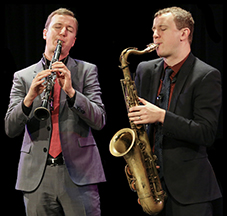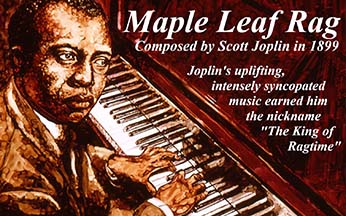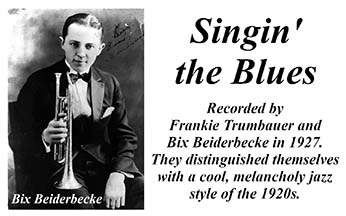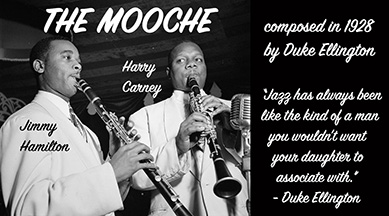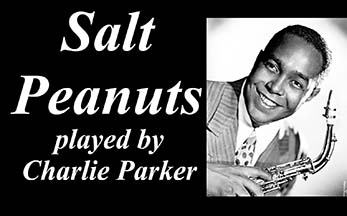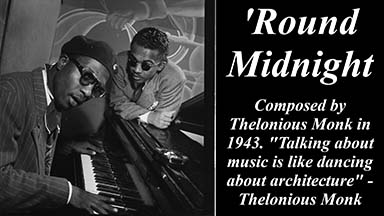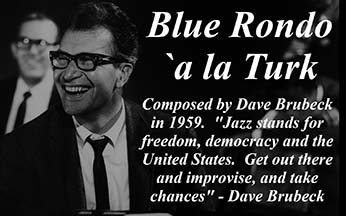By Lucy Komisar
A history of American jazz in 90 minutes? The Anderson Brothers’ “The Journey of Jazz” does so in fascinating pastiche of music and visuals, starting with Scott Joplin’s “Maple Leaf Rag,” smartly performed by pianist Dalton Ridenhour, and finishing with Henry Mancini’s “Pink Panther Theme.” They show along the way how styles evolved, how jazz composers were affected by classical music (think Thelonious Monk) and went on to influence the music of Broadway and popular culture (Richard Rodgers).
The brothers Will (who wrote the script and did the video) and Peter (the musical arrangements for the band of six), have turned such programs into a signature tour d’horizon. I saw their 2013 “Le Jazz Hot: How the French Saved Jazz,” also at 59E59, about the black artists who went to France to escape American racism.
This show is excellent for jazz devotees who are fans rather than experts. Obvious points, it’s all about the beat, especially syncopation, which distinguishes it. That was Joplin in 1899. Moving into the cool melancholy syncopation of the 20s, “Singin’ the Blues” by Frankie Trambauer played by Bix Beiderbecke 1927. Of course, then came the legendary Louis Armstrong doing “Struttin’ w/Some Barbeque.” For me, that is the start of modern jazz.
Very special is attention paid to Duke Ellington, a jazz intellectual, who discusses how jazz was a mix of European and African cultures and sounds. His “The Mooche” is cool and modern. And reflects appreciation of Chopin, Debussy, Ravel. 1928. Elegant.
“Take the A train” by Billy Strayhorn shows the best of that elegant sound.
I didn’t know the story of Benny Goodman, born in Chicago into an immigrant family that left Czarist Russia to escape anti-Semitism. His father worked for a tailor. Benny had 11 siblings and was the first to lead a racially integrated music group. He said we need the white keys and the black keys.
And into swing of the 30s. The cool jive of Lester Young, Glenn Miller and “Mooonlight Serenade,” a pop song with a jazz inflection. Gershwin’s “Summertime” in 1934. Into Beebop and Charlie Parker, a master doing the starts and stops of Dizzy Gillespie’s “Salt Peanuts.”
Then Monk in 1943 bringing classical sounds into “Round Midnight.” Pianist Ridenhour gives a delicious rendition of this cool jazz. There were other influences: Gillespie went to Cuba and added to Beebop with “Manteca.” Reminded me of bullfight music. Further south in 1962 came Antonio Carlos Jobim with “The Girl from Ipanema.” See how this is taken up by pop culture?
Or from the classics. The Andersons explain how Dave Brubeck was influenced by Stravinsky and Shostakovich. We hear his 1954 “Blue Rondo.”
Or the cross pollination back to pop: Richard Rodgers 1959 “My Favorite Things” recorded by Coltrane. Jazz has become imbedded in the pop standards. Till Mancini.
The group finishes with Peter Anderson’s own composition, “The Journey of Jazz,” which holds up fine against the brass-based jazz songs we have just heard. The Andersons are virtuosos on saxophone, clarinet, and flute.
And band members I hadn’t seen before, to repeat, pianist Dalton Ridenhour is my dream man to hold down any piano bar, which would stop patrons quaffing and turn them to listening. His playing is stunning.
Wayne Tucker is memorable on the trumpet, worthy in his solos of that instrument’s stars, including Beiderbecke, Armstrong and Gillespie.
No grades in this class. Except for the Andersons and their band, who get an “A.”
“The Journey of Jazz.” Created and directed by Peter & Will Anderson. Script and video by Will, musical arrangements by Peter. 59 East 59th Street Theaters, 59 East 59th Street NYC. Runtime 90min. Opened Nov 29, 2022, closes Dec 11, 2022.


